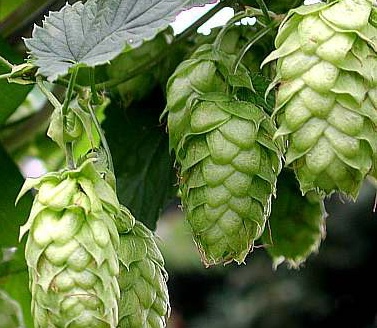
Hops (Humulus lupulus) is a close relative of cannabis, Hops has been used for centries in brewing. Ironically Henery VIII banned the addition of Hops to ales and beers and described Hops as "a wicked weed that would endanger the people." Of course, hops beer is now one of the most freely available and socially accepted drugs but certainly has 'endangered the people' with all the harm and tragedy associated with motor vehicle accidents, social and domestic violence, misadventure, alcoholism, liver damage, fatal drug combinations and so on. Yet its botanical cousin, the Hemp plant, a revered herb in Henry VIII's time, is currently banned in our time!
Hops is a dioecious perennial plant native to the Northern Hemisphere. It grows vigorously from the end of April to the beginning of July in the temperate climate zone. It is found in shrubbery and at the edge of forests with access to sufficient water, and it reaches a height of up to 7–8 m. Thus, under good conditions, the growth rate per day of the aerial parts can reach 30 cm. The total area covered by the leaves can reach 20 square meters, and the total length of the roots can reach 100 m in one growing season.
Medicinal Benefits
Hops will produce sleep when nothing else will. It has been used to decrease the desire for alcohol. Relieves delirium tremens.
Hops has a calming effect on the nervous system. Hop tea is recommended for nervous diarrhea, neuralgia, and restlessness. Helps stimulate appetite, dispel flatulence, boils, headache, toothache, earaches, pain, nervous tension and stress, jaundice, kills worms, mucus colitis, gonorrhea, ulcers, poor circulation, blood purifier, inflamed rheumatic joints, muscles cramps, neuritis, neuralgia, shock, and relieve intestinal cramps. Combined with valerian (for antispasmodic properties) for coughs. A cold tea, taken 1 hour before meals, is particularly good for digestion. Hops also have diuretic properties and can be taken for various problems with water retention and excess uric acid. Externally, a poultice can be used for inflammations, boils, ringworms, tetters, tumors, painful swellings, and old ulcers.
A hop pillow is a popular method of overcoming insomnia.
Young tips and leaves can be used as a green vegetable.
Methods of Use
Dried as a tea.
Fresh plant tincture.
Powdered and encapsulated.
As creams and lotions.
Smoked with rolling papers, pipe, or vaporizer.
Hops is often combined with other calming herbs, such as valerian.
Hops has been put into pillows to help people sleep, because the scent of hops can be calming.
Effects
When smoked, Hops gives a mild marijuana-like high with sedative qualities, but it has a rather harsh taste and is therefore not popular. Hops also becomes a sedative tea when steeped in tepid (not hot) water.
Side Effects
There are no reported side effects when used in moderation.
Although hops has sedative effects it is not recommended for administration to infants and children. Individuals who suffer from major depression or who use medication for insomnia or anxiety such as: carbamazepine, phenytoin, phenobarbital, alprazolam, diazepam, Ambien, diphenhydramine, doxepin and nortriptyline are advised to avoid taking hops due to it sedative properties as well.
Because hops has diuretic properties which may affect certain enzymes in the liver, individuals using prescription drugs such as Allegra, Sporanox and Nizoral, etoposide, paclitaxel, vinblastine, lovastatin and oral contraceptives should contact their health care provider before start using this herb.
Where to buy Hops?
Hops is available on Amazon, and eBay. You can always find great deals on these sites.
No comments:
Post a Comment